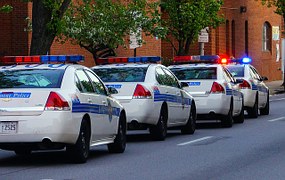 The second of two defendants who committed a 2018 armed robbery in Baltimore City was sentenced last week to 9 years in federal prison. The 29-year old defendant was originally charged in state court with, but about 7 months after the robbery the Baltimore City State’s Attorney’s Office entered the charges nolle prosequi, which meant they declined to prosecute the case. While a nolle pros. is usually a cause for celebration, in this case it was the opposite, as the case was dismissed in state court after federal prosecutors decided to take over.
The second of two defendants who committed a 2018 armed robbery in Baltimore City was sentenced last week to 9 years in federal prison. The 29-year old defendant was originally charged in state court with, but about 7 months after the robbery the Baltimore City State’s Attorney’s Office entered the charges nolle prosequi, which meant they declined to prosecute the case. While a nolle pros. is usually a cause for celebration, in this case it was the opposite, as the case was dismissed in state court after federal prosecutors decided to take over.
As detailed in guilty plea, in February of 2018 the defendant and another Baltimore City man walked into a restaurant brandishing a firearm and demanded money from the cash register. In addition to taking cash from the register and the tip jar, the defendants also took personal belongings at gunpoint from patrons at the restaurant. After the defendants left the restaurant a 911 call to the Baltimore Police was placed and officers arrived on scene shortly thereafter. One officer was canvassing the area of the robbery, and located two suspects in an alley counting cash up against a brick wall. The suspects matched the description in the 911 call, and the counting money in an alleyway was certainly another cause for concern. Both suspects were detained and searched, and police found $272 in cash, a bag of change, two masks, two bandannas, two cell phones that belonged to victims and a receipt from the restaurant. Police also found a loaded handgun in the vicinity that matched the description a victim gave of the gun used in the robbery.
There was little question that police had detained and arrested the right suspects, and a show-up identification by the victims confirmed what police already knew. The only questions remaining were who would prosecute the case, and how much time the defendants would receive. Initially the case began as a Baltimore City District Court case, and a month after the incident the State filed a 25-count indictment in the Circuit Court for Baltimore City, which included charges for first and second degree assault, armed robbery, robbery, use of a firearm in a crime of violence and firearm possession by a convicted felon. The charges regarding firearm use in a violent crime and possession by a convicted felon both carry 5-year mandatory minimum sentences upon conviction. Either way the defendants were likely going to serve at least 5 years, but ultimately the feds decided they would prosecute the case.
 Criminal Defense Lawyer Blog
Criminal Defense Lawyer Blog










